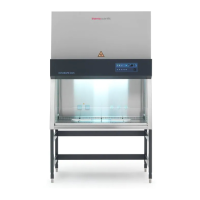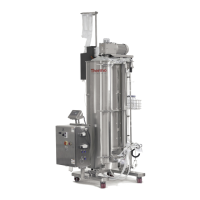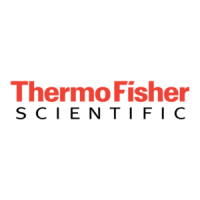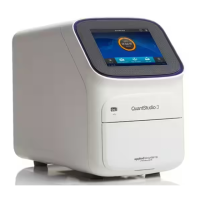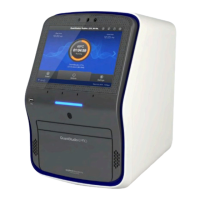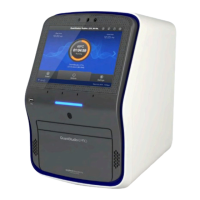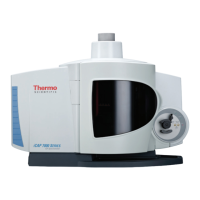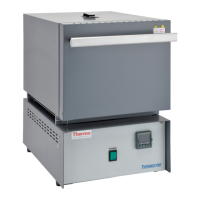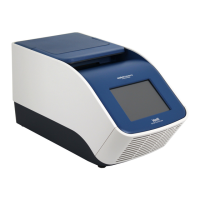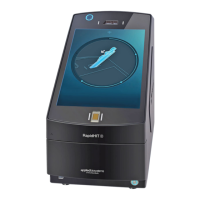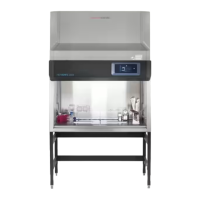
Do you have a question about the ThermoFisher Scientific HERASAFE 2030i Series and is the answer not in the manual?
| UV Light | Optional |
|---|---|
| Type | Biological Safety Cabinet |
| Class | Class II |
| Airflow Type | Laminar |
| Filtration | HEPA |
| Filter Type | HEPA |
| Electrical Requirements | 230 V, 50/60 Hz |
| Certifications | EN 12469 |
| Inflow Velocity | 0.38 - 0.51 m/s (75 - 100 fpm) |
| Weight | 180 kg (397 lbs) |
Provides contact details for Thermo Fisher Scientific sales and service organizations across different regions.
Essential safety guidelines for operating the Herasafe 2030i and Maxisafe 2030i safety cabinets.
Details Thermo Electron LED's warranty conditions for the safety cabinet's operational safety and functions.
Explains symbols used in operating instructions and on the device for safety and information.
Describes the intended applications and safety levels for Herasafe 2030i and Maxisafe 2030i safety cabinets.
Outlines prohibited uses and conditions that render the safety cabinet non-compliant or unsafe for operation.
Lists the components included with the Herasafe 2030i and Maxisafe 2030i safety cabinets upon delivery.
Outlines the procedure for checking the delivered safety cabinet for completeness and potential damage.
Provides instructions regarding the proper handling and packaging of the device during transport.
Specifies the required environmental conditions for safe and correct operation of the safety cabinet.
Details requirements for the room's ventilation system to ensure proper safety cabinet airflow.
Guides on selecting an appropriate draft-free location for installing the safety cabinet.
Provides guidelines for installing multiple safety cabinets in series, considering vibration and access.
Explains how to connect external devices and power supply to the safety cabinet.
Details the power receptacles within the sample chamber and their fusing.
Provides instructions and warnings related to the safe transport of the safety cabinet.
Provides a general overview of the Herasafe 2030i version, labeling its key components.
Details the function and components of the HEPA filters for circulating and exhaust air.
Describes the safety cabinet's control elements, including the auxiliary rocker switch and GUI.
Explains the two modes of accessing the sample chamber via the front cover and front window.
Details the standard and optional interfaces for power supply, media, and data connections.
Describes the LED lighting system installed behind the light dome for workspace illumination.
Explains the UV lamp unit, its protection, and safety considerations for UV radiation.
Describes the workplate and armrests, detailing the working area dimensions and safety relevance.
Provides instructions for installing low-voltage cables and hoses through the SmartPort access.
Emphasizes the necessity of an installation test before the initial operation of the safety cabinet.
Guides on installing the device, including options for units with or without a stand.
Details the procedure for correctly leveling the safety cabinet using adjustable levelers.
Explains how to safely establish the power supply connection, including voltage checks and grounding.
Guides the user through the initial setup process, including language, region, date, and time settings.
Describes the function of the USB port, which is reserved for servicing and software updates.
Outlines the mandatory installation inspection tests required for safe operation and warranty.
Describes the four main screen regions of the touchscreen display and their features.
Explains the information displayed in the top area, including unit name, date/time, and health status icons.
Details the main display area showing operating parameters, alarms, and event information.
Describes the touch-sensitive buttons for controlling major cabinet functions like window, illumination, and gas.
Explains the navigation bar with icons for accessing settings, event logs, and other key functions.
Describes the unit's status and display during normal working operation with the window open.
Explains the screen display and status indicators when the unit is starting up.
Describes the unit's state when the window is closed, maintaining cleanliness and containment.
Details the mode entered when the front window is fully open for cleaning or loading accessories.
Explains the state when all functions, including fans, are turned off with the window open or closed.
Describes the power-saving mode activated after inactivity, displaying a screensaver.
Covers basic operations for working with the device, including window movement.
Details how to control the movement of the front window using the auxiliary rocker switch.
Explains how to turn the interior lighting of the sample chamber on and off.
Describes how to activate or deactivate the power outlets within the sample chamber.
Explains how to control the solenoid valve for gas inflow from the control panel.
Guides users on logging into the unit when Secure Mode is activated for restricted access.
Step-by-step instructions for entering the passcode to log into a unit in Secure Mode.
Explains how to log out of the unit, returning to the main screen and shutting off functions.
Describes the built-in UV disinfection routine for additional disinfection after wipe/spray.
Provides steps to initiate the UV disinfection cycle, ensuring safety interlocks are met.
Explains how to control the fan operation during an ongoing UV disinfection cycle.
Guides on how to restart the UV disinfection cycle if it has been interrupted.
Explains how the cabinet emits visual and audible alarms for deviations from operational settings.
Details how to temporarily silence audible alarms and handle the underlying problems.
Describes alerts that do not immediately affect containment but require user attention, like filter replacement reminders.
Guides on how to respond to alerts, review details, and correct issues.
Explains how to access dedicated screens showing unit status when no alarms or alerts are present.
Shows how to check the remaining service life of UV lamps and HEPA filters.
Explains how to set up and customize the unit using various options from the settings screen.
Details how to adjust the duration of the UV disinfection cycle.
Guides on adjusting display settings like brightness, language, date, time, and units.
Explains how to adjust the screen brightness using a slider or +/- buttons.
Guides on selecting the display language, overriding initial setup settings.
Explains how to set the date displayed in the Info & Health Status Area.
Guides on setting the time of day, choosing between 12-hour and 24-hour formats.
Details how to turn the sleep mode on or off to conserve power during inactivity.
Explains how to choose between metric and imperial units for airflow measurements.
Guides on setting a custom name for the unit displayed in the Info & Health Status Area.
Explains how to swap icons in the left-hand Main Navigation Bar for personalized shortcuts.
Guides on setting the city and country for accurate time zone display and regional features.
Explains how to set up AutoStart and AutoStop functions for automating cabinet operations.
Details how to configure which functions activate automatically when the AutoStart button is pressed.
Guides on configuring which functions deactivate automatically when the AutoStop button is pressed.
Explains how to adjust volume, tone, and timing for audible alarms and alerts.
Details how to change the volume level for audible alarms and alerts.
Explains how to select different alarm tones for window-related events.
Guides on selecting different alarm tones for airflow conditions (high/low).
Details how to set the duration for temporarily silencing alarms via the Snooze button.
Explains how to adjust the volume for alerts.
Guides on selecting different tones for alerts.
Explains how to commit changes made in settings screens using the Save and OK buttons.
Shows where to find important information like serial number, firmware release, and contact details.
Guides on accessing and updating service contact information for different regions.
Outlines requirements for connecting the unit to Thermo Fisher Cloud via WiFi.
Lists technical specifications for WiFi network connection, including protocol and security.
Guides on finding and connecting to available WiFi networks.
Explains how to view or edit the settings of an already connected WiFi network.
Details the network settings for DHCP and Static/Manual IP configurations.
Guides on connecting the unit to the Thermo Fisher Cloud using mobile device or passcode.
Explains the process of connecting to the cloud using a mobile app and QR code.
Guides on connecting to the cloud using a system-generated passcode.
Shows how to interpret icons indicating WiFi and cloud connectivity status.
Describes what to do when a WiFi connection fails, including troubleshooting steps.
Explains how to update the device's firmware using a USB memory stick.
Details how to activate Secure Mode for passcode-protected access to settings.
Notes that factory settings access is reserved for Thermo Scientific Field Service personnel.
Notes that field certification access is reserved for Thermo Scientific Field Service personnel.
Explains how to access and view the log of events and alarms captured by the unit.
Guides on navigating and viewing the detailed event log entries.
Explains how to customize the event log display by filtering specific event types.
Details how to export the event log data to a USB drive in CSV format.
Outlines essential hygiene steps for disinfecting and cleaning the sample chamber and accessories.
Provides step-by-step instructions for preparing the sample chamber and installing accessories.
Guides on responding to failure messages, performing basic tests, and contacting service.
Emphasizes essential work rules for safe operation and handling of the safety cabinet.
Explains how to temporarily stop a work process by switching off the fans.
Details the procedure for completely shutting down the unit, including decontamination.
Outlines various decontamination procedures based on agent risk and required purity levels.
Describes the three stages of the standard wipe/spray disinfection procedure.
Explains how UV disinfection can be used as an additional step after wipe/spray.
Details the formaldehyde disinfection procedure, noting its risks and mandatory use for specific situations.
Guides on cleaning the exterior surfaces of the device using water and detergent.
Provides instructions for cleaning the front window.
Details the steps for cleaning the drain pan, including removing working plates.
Lists the checks performed during the annual inspection, including electrical safety and functional tests.
States that HEPA filter replacement must be done by trained personnel due to safety system interference.
Provides instructions for replacing UV lamps after 8000 operating hours, emphasizing power disconnection.
Explains how to replace the tubes for the workspace illumination system.
Guides on replacing the front cover seal if visible signs of wear are present.
Details the procedure for safely exchanging SmartPorts, emphasizing workspace contamination prevention.
States that modifications and repairs affect the safety system and must be done by authorized personnel.
Outlines how to dispose of discarded cabinets and components, emphasizing decontamination and regulations.
Provides detailed dimensions for different models of the Herasafe 2030i and Maxisafe 2030i.
Lists electrical specifications such as voltage, current, power consumption, and fusing.
Details filter types, material, and separability performance for HEPA and prefilters.
Specifies temperature, humidity, heat dissipation, and noise level parameters for the device.
Provides a template for recording maintenance, service, and repair activities performed on the device.
A form to certify that the device has been decontaminated, disinfected, and cleaned according to regulations.
A comprehensive list of cities and their corresponding UTC offsets for time zone reference.
